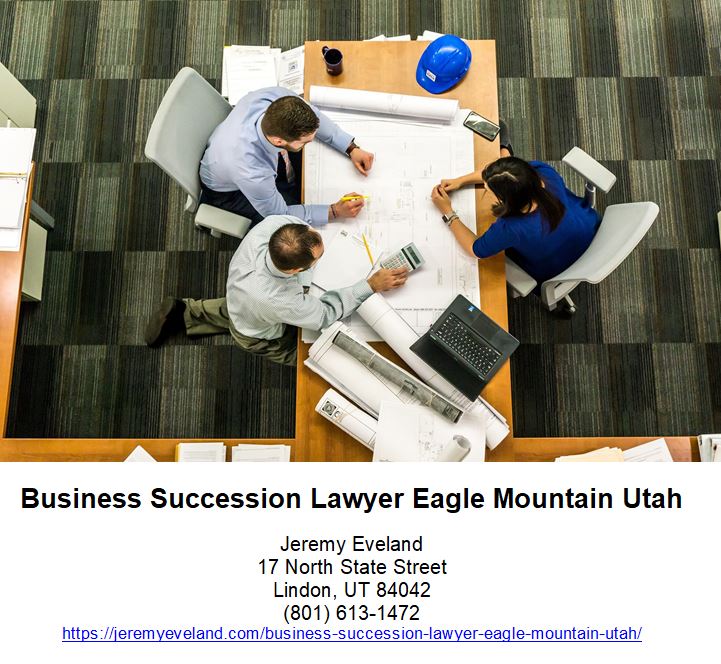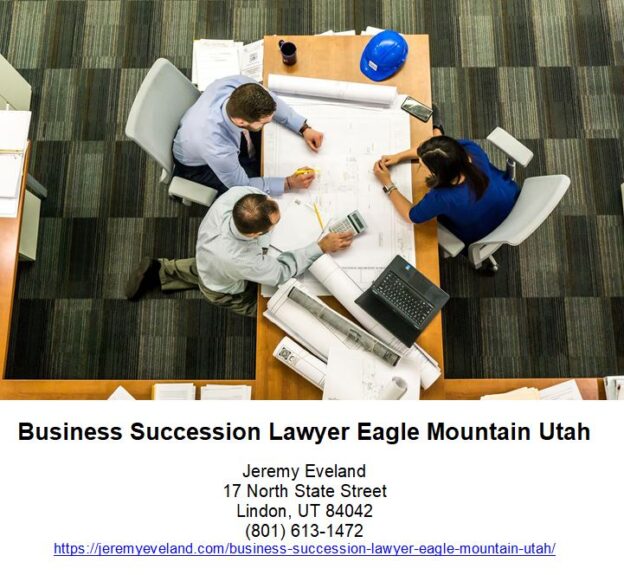“Secure Your Business’s Future with Business Succession Lawyer Eagle Mountain Utah”
Introduction
Welcome to the Law Office of Business Succession Lawyer Eagle Mountain Utah. We are a full-service law firm dedicated to providing comprehensive legal services to businesses and individuals in Eagle Mountain, Utah and the surrounding areas. Our experienced attorneys specialize in business succession planning, estate planning, and asset protection. We understand the importance of protecting your business and your family’s future, and we are committed to helping you achieve your goals. Whether you are looking to start a business, protect your assets, or plan for the future, our team of experienced attorneys can help. We look forward to working with you to ensure your success.
Why Owners Need To Do Business Succession Planning
Business succession planning is an important process for owners of businesses of all sizes. It is a way to ensure that the business will continue to operate and thrive after the current owner is no longer involved. Without proper planning, the business may suffer financially or even cease to exist.
Business succession planning involves creating a plan for the future of the business. This plan should include the transfer of ownership, the management of the business, and the financial aspects of the transition. It should also include a plan for the future of the business, such as how it will grow and develop.
Business succession planning is important for several reasons. First, it ensures that the business will continue to operate and be successful after the current owner is no longer involved. Without a plan, the business may suffer financially or even cease to exist. Second, it allows the current owner to ensure that the business is passed on to someone who is capable of running it successfully. This ensures that the business will continue to be successful and profitable.
Finally, business succession planning allows the current owner to plan for their own retirement. This ensures that they will have the financial resources to enjoy their retirement and that the business will continue to be successful.
Business succession planning is an important process for owners of businesses of all sizes. It is a way to ensure that the business will continue to operate and thrive after the current owner is no longer involved. With proper planning, the business can continue to be successful and profitable, and the current owner can enjoy their retirement.
Sell My Business Or Pass It Down To My Kids?
When it comes to deciding whether to sell your business or pass it down to your children, there are a number of factors to consider. Selling your business can provide you with a lump sum of money that can be used to fund retirement or other investments. On the other hand, passing your business down to your children can provide them with a legacy and a source of income.

When deciding whether to sell or pass down your business, it is important to consider the financial implications of both options. Selling your business can provide you with a large sum of money that can be used to fund retirement or other investments. However, if you pass your business down to your children, they may not have the financial resources to maintain the business. Additionally, if you pass your business down to your children, you may need to provide them with financial assistance to help them get the business up and running.
It is also important to consider the emotional implications of both options. Selling your business can provide you with a sense of closure and a sense of accomplishment. On the other hand, passing your business down to your children can provide them with a legacy and a source of income.
Ultimately, the decision to sell or pass down your business is a personal one. It is important to consider the financial and emotional implications of both options before making a decision.
The Role of a Business Succession Lawyer in Estate Planning in Eagle Mountain
A business succession lawyer plays an important role in estate planning in Eagle Mountain. Business succession planning is the process of preparing for the transfer of ownership and management of a business from one generation to the next. It is a complex process that requires careful consideration of legal, financial, and tax implications. A business succession lawyer can help ensure that the transition is smooth and successful.
A business succession lawyer can provide advice on the best way to structure the transfer of ownership and management of the business. They can help identify potential legal issues that may arise and provide guidance on how to address them. They can also help draft documents such as wills, trusts, and other legal documents that are necessary for the transfer of ownership and management.
A business succession lawyer can also provide advice on the tax implications of the transfer of ownership and management. They can help identify potential tax savings and ensure that the transfer is done in a way that minimizes the tax burden. They can also provide advice on how to structure the transfer of ownership and management to ensure that the business is able to continue to operate successfully.
Finally, a business succession lawyer can provide advice on how to protect the business from potential creditors and other legal issues. They can help draft contracts and other legal documents that protect the business from potential liabilities. They can also provide advice on how to structure the transfer of ownership and management to ensure that the business is able to continue to operate successfully.
A business succession lawyer can be an invaluable asset in estate planning in Eagle Mountain. They can provide advice on the best way to structure the transfer of ownership and management of the business, identify potential legal issues, and provide guidance on how to address them. They can also provide advice on the tax implications of the transfer of ownership and management and help protect the business from potential creditors and other legal issues. With the help of a business succession lawyer, the transfer of ownership and management of a business can be done in a way that is both successful and tax-efficient.
What to Expect When Working with a Business Succession Lawyer in Eagle Mountain
When working with a business succession lawyer in Eagle Mountain, you can expect a comprehensive approach to your legal needs. Your lawyer will work with you to understand your business goals and objectives, and develop a plan to ensure that your business is properly transitioned to the next generation.
Your lawyer will review your current business structure and advise you on the best way to transition your business. This may include creating a succession plan, drafting documents such as wills and trusts, and helping you to understand the tax implications of the transition. Your lawyer will also help you to understand the legal implications of any changes you make to your business structure.
Your lawyer will also provide guidance on the best way to protect your business assets. This may include creating a buy-sell agreement, setting up a trust, or establishing a limited liability company. Your lawyer will also help you to understand the legal implications of any changes you make to your business structure.
Your lawyer will also provide advice on the best way to handle any disputes that may arise during the transition process. This may include helping you to negotiate a settlement or representing you in court.
Finally, your lawyer will help you to understand the legal implications of any changes you make to your business structure. This may include understanding the implications of any changes to the ownership structure, the tax implications of any changes, and the legal implications of any changes to the business structure.
By working with a business succession lawyer in Eagle Mountain, you can ensure that your business is properly transitioned to the next generation. Your lawyer will provide you with the guidance and advice you need to ensure that your business is properly transitioned and protected.
Understanding the Benefits of Working with a Business Succession Lawyer in Eagle Mountain
Business succession planning is an important part of any business owner’s long-term strategy. It involves planning for the future of the business, including the transfer of ownership and management of the business to the next generation. Working with a business succession lawyer in Eagle Mountain can help ensure that the transition is smooth and successful.
A business succession lawyer can provide invaluable guidance and advice to business owners. They can help business owners understand the legal and financial implications of transferring ownership and management of the business. They can also help business owners create a succession plan that meets their needs and goals.
A business succession lawyer can help business owners understand the tax implications of transferring ownership and management of the business. They can also help business owners understand the legal requirements for transferring ownership and management of the business. They can also help business owners understand the legal requirements for transferring ownership and management of the business to the next generation.
A business succession lawyer can also help business owners understand the legal requirements for transferring ownership and management of the business to a third party. They can also help business owners understand the legal requirements for transferring ownership and management of the business to a trust or other entity.
A business succession lawyer can also help business owners understand the legal requirements for transferring ownership and management of the business to a family member or other individual. They can also help business owners understand the legal requirements for transferring ownership and management of the business to a corporation or other entity.
A business succession lawyer can also help business owners understand the legal requirements for transferring ownership and management of the business to a partnership or other entity. They can also help business owners understand the legal requirements for transferring ownership and management of the business to a limited liability company or other entity.
A business succession lawyer can also help business owners understand the legal requirements for transferring ownership and management of the business to a charitable organization or other entity. They can also help business owners understand the legal requirements for transferring ownership and management of the business to a foreign entity.
Here are some Business Success Quotes:
These motivational quotes are perfect for getting into the right mindset for thinking big, accomplishing your most meaningful goals, and re-focusing on the larger picture of why you committed to this hustle in the first place.
1. “Here’s to the crazy ones. The misfits. The rebels. The troublemakers. The round pegs in the square holes. The ones who see things differently. They’re not fond of rules. And they have no respect for the status quo. You can quote them, disagree with them, glorify or vilify them. About the only thing you can’t do is ignore them. Because they change things. They push the human race forward. And while some may see them as the crazy ones, we see genius. Because the people who are crazy enough to think they can change the world, are the ones who do.” – Steve Jobs. Be crazy enough to think you can change the world.
2. A constant reminder to value your work and your time. Demand that others value that too!
3. “You can’t have a million-dollar dream with a minimum-wage work ethic.” – Stephen C. Hogan. This represents a common theme here… Don’t expect big returns if you’re not making big investments. The purpose of this motivational quote? It’s going to take hard work and consistent investment to reach the top of your mountain. Keep in mind those investments can come in the form of your own education, too. If you need to learn how to pitch your idea better, then find a mentor, take a class, attend workshops, practice your freelance proposal on friends & family until it exudes confidence. It’s your time investment in this case, that’ll help you level up in your business.
4. “I will tell you the secret to getting rich on Wall Street. You try to be greedy when others are fearful. And you try to be fearful when others are greedy.” – Warren Buffett. Stand out in the crowd, push your limits, and go left when others go right (when you have good reason to do so). This motivational quote is a reminder that by doing zigging when others zag, you can capitalize on the gaps that other people are missing. And it’s common business advice from the world’s top entrepreneurs—as well as garnering widespread support throughout most of the best business books today.
5. “What we really want to do is what we are really meant to do. When we do what we are meant to do, money comes to us, doors open for us, we feel useful, and the work we do feels like play to us.” – Julia Cameron
6. “It’s not the employer who pays the wages. Employers only handle the money. It’s the customer who pays the wages.” – Henry Ford
Never forget that you’re providing value to your customers, not just the employer who hired you. This should serve as a reminder that no matter your business—you’re always serving real people at the end of the day.
7. “If you don’t value your time, neither will others. Stop giving away your time and talents. Value what you know & start charging for it.” – Kim Garst
While it’s ok taking on a few heavily discounted or free projects as you build a portfolio for your freelance business, this motivational quote is a reminder that you won’t get very far doing things just for “exposure,” especially in the world of freelancing—or without having the best freelance contract in place, for that matter.
8. “Fortune sides with him who dares.” – Virgil
Take a risk and stand out from the crowd. The core message of this motivational quote is that if you’re brave enough, you will be one of the only people pushing in a new direction, and if you’re onto something… it could lead to success. Take that chance, step up your hustle and fortune will be on your side.
9. “Don’t tell me where your priorities are. Show me where you spend your money and I will tell you what they are.” — James W. Frick
You might talk a big game about prioritizing your business, but if you are spending 50% of your budget on stuff you don’t need, that speaks louder than words. Align your budget with what you want your priorities to be. That’s the secret to truly getting where you want to go. Will achieving your goals take sacrifice? Of course, but I’d argue that most meaningful goals worthy of achieving in life should require sacrifice… otherwise they wouldn’t be meaningful. If you want to build a flexible career for yourself landing some of the best work from home jobs, that’s going to take time… effort… conviction… persistence. Show up, put in the time and financial investment it’ll take to achieve your goals.
10. “Time is more valuable than money. You can get more money, but you cannot get more time.” – Jim Rohn
Value your time more than your money, because your time is a finite resource. Use this motivational quote as a reminder not to make the mistake of spending a lot of time doing something yourself, that would cost only a little bit to delegate to someone else. Manage your opportunities wisely.
11. “Expect the best. Prepare for the worst. Capitalize on what comes.” – Zig Ziglar
Hustling is all about staying balanced, especially if you are growing your side hustle while keeping your day job—with hopes of eventually taking your own business full-time. This is a reminder that you can dream big, still have a backup plan, but always stay focused on making the most of what crosses your path.
12. “The person who doesn’t know where his next dollar is coming from usually doesn’t know where his last dollar went.” – Unknown
Don’t lose track of your income and expenses—that’s what will sustain you and help you plan for the future. If you don’t know exactly what’s happening to your bank account, you don’t have a good handle on your business. Use this motivational quote as a reminder to stay on top of your finances—because when you don’t, the outcome won’t be good.
13. “I don’t pay good wages because I have a lot of money; I have a lot of money because I pay good wages.” – Robert Bosch
Paying people the minimum is the best way to make a profit in the short run, but paying people what they deserve is the best way to make a profit in the long run, Take this as a reminder to keep an eye on loyalty and to reward good work. Those two are just as important to your bottom line.
14. “The longer you’re not taking action the more money you’re losing” – Carrie Wilkerson
That time you are spending stagnating at your day job is time you could spend fueling your dream. This is another reminder not to let the day slip by without taking positive action to improve your state. Hustle, hustle, hustle.
15. “Never depend on single income. Make investments to create a second source” – Warren Buffett
Having one plan is a surefire way to have your plan fail. Always have backups! This applies to income, too—don’t rely on one source. This motivational quote from Warren Buffet is a reminder of why having a side hustle is no longer an option for people in our generation.
16. “To acquire money requires valor, to keep money requires prudence, and to spend money well is an art.” – Berthold Auerbach
Take risks to make money, practice patience to keep money, and spend that money wisely and deliberately. In that way you are never a slave to your money, but you can always make it work for you. This reminds you to think twice before spending the money you work so hard to generate for your business.
17. “The more you learn, the more you earn.” ― Warren Buffett
You are your most valuable investment, so invest in yourself! You can never stop growing and gaining knowledge, because that’s what will drive your life (business) forward.
18. “The trouble for most people is they don’t decide to get wealthy, they just dream about it.” – Michael Masters
Like we said earlier, dreaming is free and accomplishes nothing. Put your dreams into motion and see what happens with this driving you forward.
19. “The money you attract is the exact measure of value of the ideas you have succeeded in externalizing.” – Elizabeth Towne
This motivational quote is deep and extremely insightful—soak it in for a moment. If you feel like you are not charging what you’re worth & you’re leaving money on the table, your real challenge is learning how to better sell yourself & communicate the value you have to deliver. If you’re not delivering enough value, hustle to figure out how. Focus on creating something of value, and the money you make will tell you how valuable others find it (and that’s the true measure of value anyway).
20. “All my life I knew that there was all the money you could want out there. All you have to do is go after it.” – Curtis Carlson
The only thing that is separating you and the wealth you want to accrue is what you are willing to do to get it. This is a reminder for me every single day. Nothing comes easily, but if you’re willing to grind your way towards your goals and do whatever it takes to get there, you can make anything happen.
21. “It is simple arithmetic: Your income can grow only to the extent that you do.” – T. Harv Eker. If you stagnate, your business will stagnate. If you’re lazy, your side hustle will suffer. This should keep you in check that you will need to always push forward and see how far you can grow yourself—if I hope to grow my income too.
Working with a business succession lawyer in Eagle Mountain can help business owners ensure that their succession plan is legally sound and meets their needs and goals. They can provide invaluable guidance and advice to business owners throughout the process.
How to Choose the Right Business Succession Lawyer in Eagle Mountain
Choosing the right business succession lawyer in Eagle Mountain is an important decision that can have a lasting impact on the future of your business. It is important to take the time to research and select a lawyer who is experienced in business succession law and who can provide the best legal advice and representation for your particular situation. Here are some tips to help you choose the right business succession lawyer in Eagle Mountain:
1. Research the lawyer’s experience and qualifications. Make sure the lawyer you choose has experience in business succession law and is familiar with the laws and regulations in Eagle Mountain. Ask for references and check the lawyer’s credentials to ensure they are qualified to handle your case.
2. Ask for a consultation. Before you hire a lawyer, it is important to meet with them in person to discuss your case and get a better understanding of their experience and qualifications. During the consultation, ask questions about their experience, fees, and any other relevant information.
3. Consider the lawyer’s fees. Business succession lawyers typically charge an hourly rate or a flat fee for their services. Make sure you understand the fee structure before you hire a lawyer and make sure it is within your budget.
4. Check for references. Ask the lawyer for references from past clients and contact them to get an idea of their experience with the lawyer. This will help you get a better understanding of the lawyer’s skills and abilities.
5. Ask for a written agreement. Before you hire a lawyer, make sure you get a written agreement that outlines the scope of the lawyer’s services, fees, and any other relevant information. This will help ensure that both parties understand the terms of the agreement and will help protect your interests.
By following these tips, you can ensure that you choose the right business succession lawyer in Eagle Mountain for your particular situation. Taking the time to research and select the right lawyer will help ensure that your business succession is handled properly and that your interests are protected.
How to Prepare for a Consultation with a Business Succession Lawyer in Eagle Mountain
Preparing for a consultation with a business succession lawyer in Eagle Mountain is an important step in ensuring that your business is properly transitioned to the next generation. Here are some tips to help you get the most out of your consultation:
1. Gather all relevant documents. Before your consultation, make sure to gather all relevant documents, such as business formation documents, contracts, and financial statements. This will help the lawyer understand the current state of your business and provide you with the best advice.
2. Make a list of questions. Before your consultation, make a list of questions that you would like to ask the lawyer. This will help you stay focused during the consultation and ensure that you get all the information you need.
3. Research the lawyer. Before your consultation, take some time to research the lawyer. Look at their website, read reviews, and ask for referrals. This will help you make sure that the lawyer is the right fit for your business succession needs.
4. Prepare a budget. Before your consultation, make sure to prepare a budget for the legal services you will need. This will help you understand the cost of the services and ensure that you are able to afford them.
By following these tips, you can ensure that you are prepared for your consultation with a business succession lawyer in Eagle Mountain. This will help you get the most out of your consultation and ensure that your business is properly transitioned to the next generation.
Why You Need A Business Succession Lawyer to Help You
Business succession planning is an important part of any business owner’s long-term strategy. It involves planning for the future of the business, including the transfer of ownership and management responsibilities. A business succession lawyer can help business owners ensure that their succession plan is legally sound and meets their goals.
A business succession lawyer can provide valuable advice and guidance on the legal aspects of succession planning. They can help business owners understand the legal implications of their succession plan, including the transfer of ownership and management responsibilities. They can also help business owners draft and review legal documents, such as wills, trusts, and contracts, to ensure that the succession plan is legally binding.
A business succession lawyer can also help business owners understand the tax implications of their succession plan. They can provide advice on how to minimize taxes and maximize the value of the business. They can also help business owners understand the legal requirements for transferring ownership and management responsibilities.
A business succession lawyer can also provide advice on how to protect the business from potential legal issues. They can help business owners understand the legal implications of their succession plan and how to protect the business from potential lawsuits. They can also provide advice on how to protect the business from creditors and other third parties.
Finally, a business succession lawyer can provide advice on how to ensure that the succession plan is properly implemented. They can help business owners understand the legal requirements for transferring ownership and management responsibilities and ensure that the succession plan is properly executed.
A business succession lawyer can provide invaluable advice and guidance on the legal aspects of succession planning. They can help business owners understand the legal implications of their succession plan and ensure that the succession plan is legally sound and meets their goals.
Q&A
1. What is a business succession lawyer?
A business succession lawyer is a lawyer who specializes in helping business owners plan for the future of their business. They help business owners create a plan for the transfer of ownership and management of the business, as well as provide advice on tax and estate planning. They also help business owners understand the legal implications of their decisions and ensure that their succession plan is legally sound.
2. What services does a business succession lawyer provide?
A business succession lawyer provides a variety of services to help business owners plan for the future of their business. These services include helping business owners create a succession plan, providing advice on tax and estate planning, and helping business owners understand the legal implications of their decisions. They also help business owners create documents such as wills, trusts, and other legal documents to ensure that their succession plan is legally sound.
3. How can a business succession lawyer help me?
A business succession lawyer can help you create a plan for the future of your business. They can provide advice on tax and estate planning, help you understand the legal implications of your decisions, and create documents such as wills, trusts, and other legal documents to ensure that your succession plan is legally sound.
4. What should I look for in a business succession lawyer?
When looking for a business succession lawyer, you should look for someone who is experienced in the field and has a good understanding of the legal implications of your decisions. You should also look for someone who is knowledgeable about tax and estate planning and can provide you with sound advice.
5. How much does a business succession lawyer cost?
The cost of a business succession lawyer will vary depending on the complexity of your situation and the services you require. Generally, you can expect to pay anywhere from $150 to $500 per hour for their services.
6. What should I expect during my first meeting with a business succession lawyer?
During your first meeting with a business succession lawyer, you should expect to discuss your goals and objectives for the future of your business. The lawyer will ask you questions about your business and the legal implications of your decisions. They will also provide advice on tax and estate planning and help you create a plan for the transfer of ownership and management of the business.
7. What documents should I bring to my first meeting with a business succession lawyer?
When meeting with a business succession lawyer, you should bring any documents related to your business, such as financial statements, tax returns, and other legal documents. You should also bring any documents related to your estate planning, such as wills, trusts, and other legal documents.
8. How long does it take to create a business succession plan?
The amount of time it takes to create a business succession plan will vary depending on the complexity of your situation and the services you require. Generally, it can take anywhere from a few weeks to several months to create a plan.
Business Succession Lawyer Eagle Mountain Utah Consultation
When you need help from a Business Succession Lawyer near Eagle Mountain Utah call Jeremy D. Eveland, MBA, JD (801) 613-1472 for a consultation.
Jeremy Eveland
17 North State Street
Lindon UT 84042
(801) 613-1472
Home
Related Posts
Creating Business Systems
Dispute Resolution
Mediation
Arbitration
OSHA Law
Sustainable Business Model
Business Success
Management Training
Leadership Training
Estate Planning Lawyer West Valley City Utah
Business Contract Lawyer Spanish Fork
Accord and Satisfaction
Civil Litigation
Business Market Research
Corporate Attorney Riverton Utah
Advantages of Hiring a Utah Personal Injury Lawyer
Full Service Law Firm
Estate Planning Lawyer Provo Utah
Line of Credit
Issuance of Stock
Fair Labor Standards Act
Company Lawyer
Business Lawyer West Valley City Utah
Non-Profit Organizations
Creation of Trusts
Business Risk Management
Legal System
Trust Lawyer
Business Succession Lawyer Eagle Mountain Utah
[geocentric_weather id=”dba4f425-7d56-4664-94fe-d54c415f2151″]
[geocentric_about id=”dba4f425-7d56-4664-94fe-d54c415f2151″]
[geocentric_neighborhoods id=”dba4f425-7d56-4664-94fe-d54c415f2151″]
[geocentric_thingstodo id=”dba4f425-7d56-4664-94fe-d54c415f2151″]
[geocentric_busstops id=”dba4f425-7d56-4664-94fe-d54c415f2151″]
[geocentric_mapembed id=”dba4f425-7d56-4664-94fe-d54c415f2151″]
[geocentric_drivingdirections id=”dba4f425-7d56-4664-94fe-d54c415f2151″]
[geocentric_reviews id=”dba4f425-7d56-4664-94fe-d54c415f2151″]

















